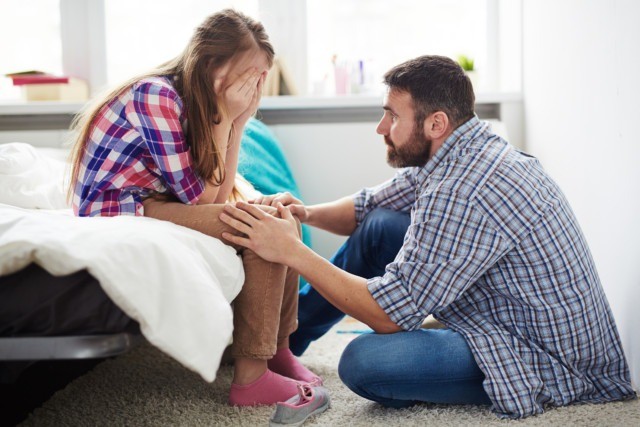
Depression is serious business, particularly in children and adolescents. Depression impacts about of 20 percent of teens prior to adulthood, and research supports that these numbers are increasing. Sadly, when depression rates increase, so do rates of suicide, self-injury, and substance abuse. Many times, as parents, we struggle with how to help and what to do.
Recent research, presented at the 2018 American Psychological Association Conference, found that symptoms of depression in teens and parents appear to be linked. When a teen’s depression improved through treatment, so did the depressive symptoms experienced by his or her parent. In this study, of the children referred for depression concerns, 25% of parents also had these same concerns. These statistics make sense, as depression often runs in families due to shared genetics and biology. Depression is also more common in families due to a shared home environment, and modeling in coping skills by parents.
At the end of the study, by treating the teens (with cognitive behavioral therapy, medication, or both), the teen’s depression lessened. An interesting effect was also observed: when the adolescent’s depression improved, so did parent’s depressive symptoms, regardless of what treatment was used (CBT, medication, or both CBT and depression).
How can this information help parents?
If you are a parent seeking help for your child, you should consider have yourself screened for parent depression too
As parents, we love our children and are attached to them. Our children also love us and are attached to us. When our children struggle, so do we. When we struggle, so do our children.
It is our responsibility as parents to give our children the best likelihood for improvement
Improvement for your teen may mean that you must also seek treatment for yourself. Parents are the authority figures and leaders in the home, and children often cannot exceed the coping and functioning levels of their parents.
Get an outside assessment from someone that you trust
Conditions like anxiety and depression can have insidious beginnings, and some parents may even be surprised to learn that they are also struggling with depression. Because we internalize these concerns, people cannot always recognize these symptoms in themselves. If you are unsure of where to receive the a mental health screening, ask your child’s clinician. They will be able to help. You can also ask your Primary Care Physician or insurance company for a referral.
The concept of emotions being ‘contagious’ and spreading from person to person is well-known by psychologists
We discussed this phenomenon in a blog post on the relationship between parent and child anxiety. If you do have symptoms of depression and anxiety, you can be a powerful and positive role-model for your child. Oftentimes, by taking the leadership role, and modeling positive coping skills, such as seeking help from mental health professional, children and teens also do much better.
Continue to support your child’s therapy
If your child or teen is participating in psychotherapy for anxiety, depression, or other mental health concerns, it is important to support those efforts. Offer to drive your child, and serve as a support. Communicate with their therapist, and support the work that s/he is doing with your child. Ask your child and her therapist if there are things that you can do to help at home. Let your child know that you are there for her. Be respectful and involved. By supporting your child’s therapy, you will also do better.
If your child is struggling with anxiety or depression, use self-care regularly
Learn the skills your child is learning in his therapy. Practice them yourself. By modeling these skills, your child will likely feel less alone. She will learn that self-care is important for everyone. She will see how these skills can be integrated into her life. It will also help you have more energy and patience for your teen – depressed teens can take a lot of energy from parents. You will have first-hand knowledge of how hard it is to learn new ways of thinking, feeling and responding, as well as how helpful these skills can be.
![]()
